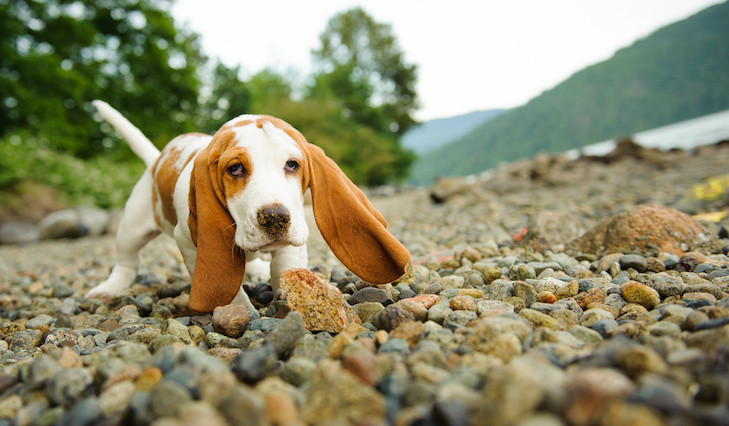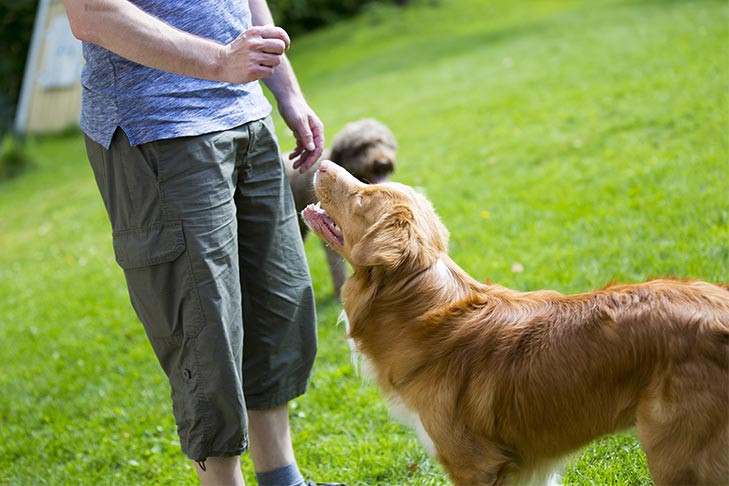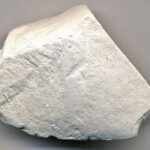Can Dogs Chew Rocks? Yes, dogs sometimes chew on rocks due to medical, behavioral, or psychological factors, and it can lead to serious health issues; however, on rockscapes.net, we will help you understand why and how to stop this behavior, creating a safer environment for your pet. Addressing this issue involves understanding the causes, implementing effective training techniques, and enriching your dog’s life to prevent boredom.
1. Why Do Dogs Chew on Rocks? Unveiling the Reasons
A dog eating rocks can stem from various underlying issues.
- Nutritional Deficiencies: Pica, an eating disorder, may cause dogs to compulsively eat inedible objects due to a lack of essential nutrients in their diet.
- Underlying Medical Conditions: Canine diabetes, internal parasites, worms, or even tumors can trigger rock-eating behavior.
- Teething Pain: Puppies often chew on rocks to relieve the discomfort of teething.
- Attention-Seeking: Dogs may chew on rocks to get their owner’s attention, especially if they are feeling anxious, annoyed, or frustrated.
- Curiosity and Exploration: Like human babies, puppies explore their world by tasting different objects, including rocks.
- Boredom: A lack of mental and physical stimulation can lead to boredom, causing dogs to chew on rocks out of sheer monotony.
Mindy Tusko, a dog trainer and owner of Pawsitive Results Training, emphasizes that dogs, like human babies, explore their world through tasting and that boredom is a significant contributor to rock-eating behavior.
 Basset Hound puppy walking on a rocky beach enjoying the natural surroundings and exploring with its senses
Basset Hound puppy walking on a rocky beach enjoying the natural surroundings and exploring with its senses
2. What Are the Risks of Dogs Chewing on Rocks? Health and Safety Concerns
Chewing and swallowing rocks pose several risks to your dog’s health and well-being:
- Intestinal Blockages: Rocks can obstruct the digestive tract, requiring surgical intervention.
- Digestive Issues: Rocks can irritate the stomach and intestines, leading to vomiting, diarrhea, and abdominal pain.
- Choking: Small rocks can become lodged in the throat, causing choking and potentially life-threatening situations.
- Damage to Teeth: Chewing on hard rocks can fracture or wear down teeth, leading to pain and infection.
3. How Can I Stop My Dog From Eating Rocks? Effective Strategies and Training
Addressing rock-eating behavior requires a multi-faceted approach:
- Veterinary Consultation: Rule out any underlying medical conditions or nutritional deficiencies with a thorough veterinary examination.
- Obedience Training: Teach your dog essential commands like “leave it” and “drop it” to discourage rock consumption.
- Environmental Management: Remove rocks from your dog’s environment or supervise them closely when rocks are present.
- Enrichment and Stimulation: Provide plenty of mental and physical stimulation to combat boredom.
- Dietary Adjustments: Ensure your dog’s diet is nutritionally balanced and consider adding supplements if recommended by your veterinarian.
4. Why Are “Leave It” and “Drop It” Commands So Important?
“Leave it” and “drop it” commands are crucial for preventing and stopping rock-eating behavior.
- “Leave It”: Teaches your dog to ignore or avoid picking up rocks in the first place.
- “Drop It”: Instructs your dog to release a rock that is already in their mouth.
These commands empower you to redirect your dog’s attention away from rocks and prevent them from swallowing them. Mindy Tusko emphasizes that these commands can be life-saving for dogs.
 Nova Scotia Duck Tolling Retriever being trained in the park demonstrating focus and obedience to commands
Nova Scotia Duck Tolling Retriever being trained in the park demonstrating focus and obedience to commands
5. How to Teach the “Leave It” Command?
- Start with a Treat: Hold a treat in your closed hand and let your dog sniff it.
- Say “Leave It”: As your dog tries to get the treat, say “Leave it” in a firm voice.
- Reward for Ignoring: Once your dog stops trying to get the treat, open your hand and give them the treat from your other hand.
- Practice with Rocks: Gradually introduce rocks into the training process, using the same steps.
6. How to Teach the “Drop It” Command?
- Offer a Trade: When your dog has a rock in their mouth, offer them a more enticing treat or toy.
- Say “Drop It”: As your dog drops the rock to take the trade, say “Drop it”.
- Praise and Reward: Give your dog the treat or toy and offer enthusiastic praise.
- Practice Regularly: Practice the “drop it” command regularly in various situations.
7. What Kind of Positive Reinforcement Can I Use?
Positive reinforcement is key to successful dog training.
- Verbal Praise: Use encouraging words like “Good dog” or “Yes” when your dog obeys a command.
- Treats: Offer small, tasty treats as a reward for good behavior.
- Physical Affection: Provide hugs, belly rubs, and petting to show your dog your love and appreciation.
- Toys: Use toys as a reward, especially if your dog enjoys playing fetch or tug-of-war.
Mindy Tusko notes that a dog’s love and affection is a very high reward for them.
8. What Are Engaging Activities Can I Provide My Dog?
Engaging activities can help prevent boredom and redirect your dog’s attention away from rocks.
- Dog Sports: Participate in dog sports like agility, herding, or flyball to provide physical and mental challenges.
- Training Programs: Enroll in training programs like Canine Good Citizen (CGC) to improve obedience and strengthen the bond with your dog.
- Interactive Toys: Provide interactive toys that require your dog to solve puzzles or work for their food.
- Daily Walks: Take your dog on daily walks to explore new environments and burn energy.
- Playdates: Arrange playdates with other dogs to socialize and engage in playful activities.
Contact your local AKC club to get started in dog sports or classes.
9. What to Do if My Dog Swallows a Rock?
If you suspect your dog has swallowed a rock, it is crucial to seek immediate veterinary attention.
- Observe Your Dog: Monitor your dog for signs of distress, such as vomiting, gagging, abdominal pain, or loss of appetite.
- Contact Your Veterinarian: Call your veterinarian immediately and explain the situation.
- Follow Veterinary Advice: Follow your veterinarian’s instructions carefully. They may recommend inducing vomiting, performing an X-ray, or performing surgery to remove the rock.
10. What Are Some Breeds That Are More Prone to Eating Rocks?
While any dog can develop rock-eating habits, some breeds may be more predisposed due to their inherent traits and tendencies:
- Labrador Retrievers: Known for their high energy levels and playful nature, Labradors may chew on rocks out of boredom or curiosity.
- Golden Retrievers: Similar to Labradors, Golden Retrievers are intelligent and active dogs that require ample stimulation.
- German Shepherds: As highly intelligent and driven dogs, German Shepherds may develop rock-eating habits if they are not mentally and physically challenged.
- Huskies: Bred for endurance and independence, Huskies may resort to chewing on rocks to relieve boredom or anxiety.
- Terriers: With their strong prey drive and inquisitive nature, Terriers may be tempted to chew on rocks while exploring their surroundings.
While breed predispositions can offer insights, remember that individual dogs within any breed may exhibit varied behaviors.
11. How Can I Create a Safe Outdoor Environment for My Dog?
Creating a safe outdoor environment is essential for preventing rock-eating and other potential hazards.
- Remove Rocks: Remove any loose rocks or stones from your yard or garden.
- Supervise Closely: Always supervise your dog when they are outdoors, especially in areas where rocks may be present.
- Provide Safe Chew Toys: Offer a variety of safe chew toys to satisfy your dog’s natural chewing instincts.
- Designate a “Safe Zone”: Create a designated area in your yard where your dog can play and relax without access to rocks or other potential hazards.
- Use a Muzzle: If your dog has a persistent rock-eating problem, consider using a muzzle when they are outdoors to prevent them from picking up rocks.
12. Can Dietary Changes Help Stop My Dog From Eating Rocks?
In some cases, dietary changes can help address rock-eating behavior, especially if it is related to nutritional deficiencies.
- Balanced Diet: Ensure your dog is eating a high-quality, nutritionally balanced diet that meets their specific needs.
- Fiber Supplementation: Adding fiber to your dog’s diet can help them feel fuller and reduce the urge to eat non-food items.
- Mineral Supplementation: If your veterinarian suspects a mineral deficiency, they may recommend a mineral supplement.
- Smaller, More Frequent Meals: Feeding your dog smaller, more frequent meals can help stabilize their blood sugar levels and reduce the risk of pica.
13. What Is Pica?
Pica is an eating disorder characterized by the persistent consumption of non-nutritive substances, such as rocks, dirt, or fabric.
- Causes: Pica can be caused by nutritional deficiencies, underlying medical conditions, behavioral issues, or psychological factors.
- Symptoms: Symptoms of pica include compulsive eating of non-food items, vomiting, diarrhea, and abdominal pain.
- Treatment: Treatment for pica typically involves addressing any underlying medical conditions, correcting nutritional deficiencies, and implementing behavioral modification techniques.
According to research from Arizona State University’s School of Earth and Space Exploration, in July 2025, addressing nutritional deficiencies will be key in treating Pica.
14. How to Differentiate Between Normal Chewing Behavior and Pica?
Differentiating between normal chewing behavior and pica is essential for determining the appropriate course of action.
- Normal Chewing Behavior: Dogs naturally chew on objects to explore their environment, relieve teething pain, or keep their teeth clean. Normal chewing behavior is typically directed at appropriate chew toys and does not involve the persistent consumption of non-food items.
- Pica: Pica is characterized by the compulsive and persistent consumption of non-food items, even when appropriate chew toys are available. Dogs with pica may ingest large quantities of non-food items, leading to health problems.
15. What Are the Potential Consequences of Untreated Pica?
Untreated pica can have serious consequences for your dog’s health and well-being.
- Intestinal Blockages: Ingestion of non-food items can lead to intestinal blockages, requiring surgery.
- Toxicity: Some non-food items may contain toxic substances that can poison your dog.
- Nutritional Deficiencies: Pica can interfere with the absorption of essential nutrients, leading to nutritional deficiencies.
- Dental Problems: Chewing on hard non-food items can damage your dog’s teeth.
16. Are There Any Specific Dog Toys That Can Help With Chewing?
Yes, there are many dog toys designed to satisfy chewing instincts and redirect your dog’s attention away from rocks.
- Durable Chew Toys: Choose chew toys made from durable materials that can withstand strong chewing, such as rubber or nylon.
- Puzzle Toys: Puzzle toys challenge your dog mentally and physically, keeping them entertained and engaged.
- Food-Dispensing Toys: Food-dispensing toys release treats or kibble as your dog chews, providing a rewarding experience.
- Dental Chew Toys: Dental chew toys help clean your dog’s teeth and massage their gums.
- Rope Toys: Rope toys are great for chewing and playing tug-of-war.
17. Is There a Link Between Anxiety and Rock-Eating in Dogs?
Yes, anxiety can contribute to rock-eating behavior in dogs.
- Anxiety Relief: Some dogs chew on rocks as a way to relieve anxiety or stress.
- Attention-Seeking: Anxious dogs may chew on rocks to get their owner’s attention.
- Compulsive Behavior: In some cases, rock-eating can become a compulsive behavior associated with anxiety.
18. How to Identify and Manage Anxiety in Dogs?
Identifying and managing anxiety in dogs is essential for addressing rock-eating behavior and improving their overall well-being.
- Signs of Anxiety: Signs of anxiety in dogs include excessive barking, pacing, panting, trembling, hiding, and destructive behavior.
- Causes of Anxiety: Anxiety in dogs can be caused by various factors, such as separation anxiety, noise phobias, and social anxiety.
- Management Strategies: Management strategies for anxiety in dogs include providing a safe and comfortable environment, desensitization and counterconditioning, medication, and behavioral therapy.
19. What Role Does Genetics Play in Rock-Eating Behavior?
The role of genetics in rock-eating behavior is not fully understood, but some research suggests that certain breeds may be more predisposed to developing this habit.
- Breed Predispositions: Some breeds, such as Labrador Retrievers and German Shepherds, may be more likely to exhibit rock-eating behavior due to their genetic predispositions for certain personality traits, such as high energy levels and a strong prey drive.
- Individual Variation: However, it is important to remember that individual dogs within any breed may exhibit varied behaviors, and genetics is only one factor that can contribute to rock-eating behavior.
20. Are There Any Home Remedies to Stop My Dog From Eating Rocks?
While home remedies may provide temporary relief, it is essential to consult with your veterinarian to determine the underlying cause of your dog’s rock-eating behavior and develop a comprehensive treatment plan.
- Bitter Apple Spray: Applying bitter apple spray to rocks may deter your dog from chewing on them.
- Taste Deterrents: You can try applying other taste deterrents to rocks, such as lemon juice or hot sauce.
- Increased Supervision: Supervise your dog closely when they are outdoors and redirect their attention away from rocks.
- Environmental Enrichment: Provide plenty of mental and physical stimulation to combat boredom and reduce the urge to eat rocks.
21. What Are the Long-Term Effects of Rock-Eating on a Dog’s Health?
Long-term rock-eating can have several detrimental effects on your dog’s health.
- Chronic Digestive Issues: Persistent ingestion of rocks can lead to chronic digestive problems, such as vomiting, diarrhea, and abdominal pain.
- Malnutrition: Rock-eating can interfere with the absorption of essential nutrients, leading to malnutrition.
- Dental Problems: Chewing on hard rocks can cause significant dental damage, including fractured teeth and gum disease.
- Internal Organ Damage: In severe cases, rock-eating can lead to internal organ damage, such as kidney or liver damage.
22. How to Choose the Right Chew Toys for My Dog?
Choosing the right chew toys for your dog is crucial for preventing rock-eating and promoting dental health.
- Size and Durability: Choose chew toys that are appropriately sized for your dog and made from durable materials that can withstand strong chewing.
- Safety: Ensure that the chew toys are safe and non-toxic. Avoid toys with small parts that could be swallowed.
- Interest: Select chew toys that are appealing to your dog and will keep them entertained.
- Variety: Provide a variety of chew toys to prevent boredom.
23. Can a Dog’s Age Affect Rock-Eating Behavior?
Yes, a dog’s age can influence their likelihood of engaging in rock-eating behavior.
- Puppies: Puppies are more likely to chew on rocks due to teething pain and their natural curiosity.
- Adult Dogs: Adult dogs may chew on rocks due to boredom, anxiety, or underlying medical conditions.
- Senior Dogs: Senior dogs may chew on rocks due to cognitive decline or dental problems.
24. How to Monitor My Dog After They Have Eaten a Rock?
If your dog has eaten a rock, it is essential to monitor them closely for any signs of distress.
- Vomiting: Watch for vomiting, especially if it contains blood or pieces of rock.
- Diarrhea: Monitor your dog’s stool for any signs of diarrhea or blood.
- Loss of Appetite: If your dog refuses to eat, it could be a sign of a digestive problem.
- Abdominal Pain: Gently palpate your dog’s abdomen to check for any signs of pain or tenderness.
- Lethargy: If your dog seems unusually tired or lethargic, it could be a sign of a more serious problem.
25. When Should I Seek Professional Help for My Dog’s Rock-Eating Habit?
Seek professional help from a veterinarian or certified dog trainer if:
- Your dog is consistently eating rocks despite your best efforts to stop them.
- Your dog is exhibiting signs of illness, such as vomiting, diarrhea, or loss of appetite.
- You suspect your dog has swallowed a large rock or multiple rocks.
- You are concerned about your dog’s safety or well-being.
26. What Are the Benefits of Hiring a Professional Dog Trainer?
Hiring a professional dog trainer can provide numerous benefits for addressing rock-eating behavior and improving your dog’s overall behavior.
- Expert Guidance: A professional dog trainer can provide expert guidance and support based on their knowledge and experience.
- Customized Training Plan: A trainer can develop a customized training plan that is tailored to your dog’s specific needs and challenges.
- Effective Techniques: Trainers use proven and effective training techniques to address rock-eating behavior and other behavioral issues.
- Improved Communication: Training can improve communication and understanding between you and your dog.
27. How to Find a Qualified and Reputable Dog Trainer?
Finding a qualified and reputable dog trainer is essential for ensuring that your dog receives the best possible care and training.
- Certifications: Look for trainers who are certified by reputable organizations, such as the Certification Council for Professional Dog Trainers (CCPDT).
- Experience: Choose a trainer with extensive experience in addressing rock-eating behavior and other behavioral issues.
- References: Ask for references from previous clients and check online reviews.
- Training Methods: Inquire about the trainer’s training methods and ensure that they are positive and humane.
- Consultation: Schedule a consultation with the trainer to discuss your dog’s specific needs and goals.
28. Are There Any Support Groups for Owners of Dogs Who Eat Rocks?
While there may not be specific support groups dedicated solely to owners of dogs who eat rocks, there are numerous online forums and communities where you can connect with other dog owners and share experiences.
- Online Forums: Search for online forums dedicated to dog behavior and training, where you can ask questions and receive advice from other dog owners and professionals.
- Social Media Groups: Join social media groups for dog owners, where you can share your experiences and connect with others who may be facing similar challenges.
- Local Dog Clubs: Attend meetings of local dog clubs, where you can meet other dog owners and learn about training and behavior.
29. How to Prevent Rock-Eating Behavior in Puppies?
Preventing rock-eating behavior in puppies is crucial for establishing good habits and preventing health problems.
- Early Training: Start training your puppy early and teach them essential commands like “leave it” and “drop it.”
- Supervision: Supervise your puppy closely when they are outdoors and redirect their attention away from rocks.
- Safe Chew Toys: Provide a variety of safe chew toys to satisfy your puppy’s natural chewing instincts.
- Environmental Enrichment: Provide plenty of mental and physical stimulation to prevent boredom.
- Proper Nutrition: Ensure your puppy is eating a high-quality, nutritionally balanced diet.
30. What Are the Alternative Ground Cover Options to Rocks?
If your dog has a persistent rock-eating problem, you may want to consider alternative ground cover options for your yard or garden.
- Grass: Grass is a safe and natural ground cover option that is easy to maintain.
- Mulch: Mulch can provide a soft and comfortable surface for your dog to walk on and can also help suppress weeds.
- Wood Chips: Wood chips are another natural ground cover option that is relatively inexpensive and easy to install.
- Artificial Turf: Artificial turf is a low-maintenance option that provides a safe and comfortable surface for your dog to play on.
31. How Can Rockscapes.net Help With Creating a Safe and Beautiful Landscape for My Dog?
At rockscapes.net, we are passionate about creating beautiful and functional landscapes that are safe for your furry friends. Our team of experienced landscape designers can help you choose the right materials and design a landscape that meets your dog’s needs while enhancing the beauty of your home.
- Safe Material Selection: We can help you select safe and non-toxic materials for your landscape, such as smooth river rocks, pea gravel, or mulch.
- Dog-Friendly Design: We can design a landscape that incorporates dog-friendly features, such as designated play areas, walking paths, and shaded resting spots.
- Expert Installation: Our team of skilled installers can ensure that your landscape is installed correctly and safely.
Address: 1151 S Forest Ave, Tempe, AZ 85281, United States.
Phone: +1 (480) 965-9011.
Website: rockscapes.net.
32. Frequently Asked Questions (FAQ) About Dogs Chewing Rocks
Q1: Why is my dog suddenly eating rocks?
Sudden rock-eating can be due to a nutritional deficiency, boredom, stress, or an underlying medical issue. Consult your vet to rule out health problems and adjust diet or environment accordingly.
Q2: Is rock-eating a sign of anxiety in dogs?
Yes, anxiety can trigger rock-eating as a coping mechanism. Provide more mental and physical stimulation, and consider consulting a behaviorist for severe cases.
Q3: What should I do if my puppy starts chewing on rocks?
Supervise your puppy closely, remove rocks from their environment, and offer appropriate chew toys. Teach “leave it” and “drop it” commands early.
Q4: Can certain dog breeds be more prone to eating rocks?
While any breed can develop the habit, high-energy breeds like Labradors and German Shepherds may be more prone due to boredom or curiosity.
Q5: Are there any specific nutrients my dog might be lacking if they eat rocks?
Nutritional deficiencies, especially in minerals like iron or zinc, can cause pica. Consult your vet for a blood test and dietary recommendations.
Q6: How can I differentiate between normal chewing and pica in my dog?
Normal chewing is directed at appropriate objects, while pica involves compulsive consumption of non-food items like rocks.
Q7: What are some safe alternatives to rocks for landscaping if my dog eats them?
Consider using mulch, wood chips, or grass as safer ground cover options in areas where your dog spends time.
Q8: Can I use a muzzle to stop my dog from eating rocks?
Yes, a muzzle can prevent rock-eating, but ensure it fits properly and allows your dog to pant and drink water comfortably.
Q9: How often should I take my rock-eating dog to the vet?
Regular check-ups are crucial. If your dog eats rocks frequently, visit the vet every 3-6 months for monitoring and potential interventions.
Q10: Is there a specific type of rock that is more dangerous for dogs to eat?
Small, easily swallowable rocks are the most dangerous as they pose a choking hazard and can cause intestinal blockages.
Understanding why dogs chew rocks is the first step toward correcting the behavior. With proper training, environmental management, and veterinary care, you can protect your dog’s health and create a safer, more enjoyable environment for them. Explore rockscapes.net for more insights and solutions to create a beautiful and safe landscape for your beloved pet.

